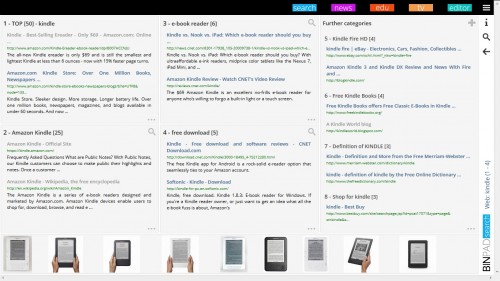BinPad Promises a New Way to Help you Search for and Find Content
CES is ![5229159351_a1405a1c2a_b[1]](https://the-digital-reader.com/wp-content/uploads/2014/01/5229159351_a1405a1c2a_b1-250x166.jpg)
At the CES Unveiled event Sunday night I came across a new search engine called BinPad. It’s the work of a Hungarian startup called XDroid, and it promises to offer a new way to find content.
According to their website XDroid specializes in AI, which in this case means that they have developed a new way to find and organize related data. BinPad is in some ways a working tech demo which shows off what XDroid can do, and it includes examples of how BinPad could work with search results, educational content, and news. (XDroid is also going to have demos for TV content and user-generated content but they’re not available yet.)
The news section wasn’t terribly clever at suggesting stories, and educational section was strictly a limited demo, so I spent some time today playing around with the BinPad search engine. It has interesting potential.
As a simple test, I looked up the word Kindle and these are the results I got:
The organic search results (what Google would give you) are found in the first section on the left. The other sections on the screen are suggested results based on what BinPad thinks are related terms, and along the bottom of the screen are a set of images related to the search term.
In addition to selecting one of the results, you can click on the 3 dots in the lower right corner of each section and get more results for that section or you can click on the search symbol in the upper right corner and focus on that particular term. This will bring up a set of suggested related search results.
If you keep clicking on one or another search symbol you can navigate from one related term to another, eventually getting far off topic. This could be useful at times; serendipity is sometimes a useful search tool and few search engines are set up to take advantage of it.
I think BinPad could use some more work on suggesting related terms, but there are still a few interesting ideas here. For example, the way the results are organized is much more useful and practical than most search engines, which usually give you a single column of results. Sometimes this can result in spurious results being mixed in because the search engine thought the results were relevant even though they don’t strictly meet the search criteria (Amazon’s search engine is pretty bad on this – almost to the point of being useless). Pulling out suggested related results into their own sections is an idea worth adopting.
BinPad would benefit from a third option for the search results; I want a delete button. If a suggested related term isn’t relevant to what I want then I would like to be able to get rid of it and see a different suggested result.
And there are ideas here which I would like to see adopted by bookstore websites, but to get the maximum effect they would also need to improve the pool of content in which they are searching.
I’m not referring to the books, just the metadata supplied by authors and publishers. It would be interesting to see BinPad’s hierarchical search results be combined with a deeper understanding of the content of a book – one provided by BookLamp, for example. That Idaho based startup is quite good at telling you a book’s genome, but I think that it might be able to learn a thing or two about how to show how 2 books relate to each other.
image by liewcf



No Comments